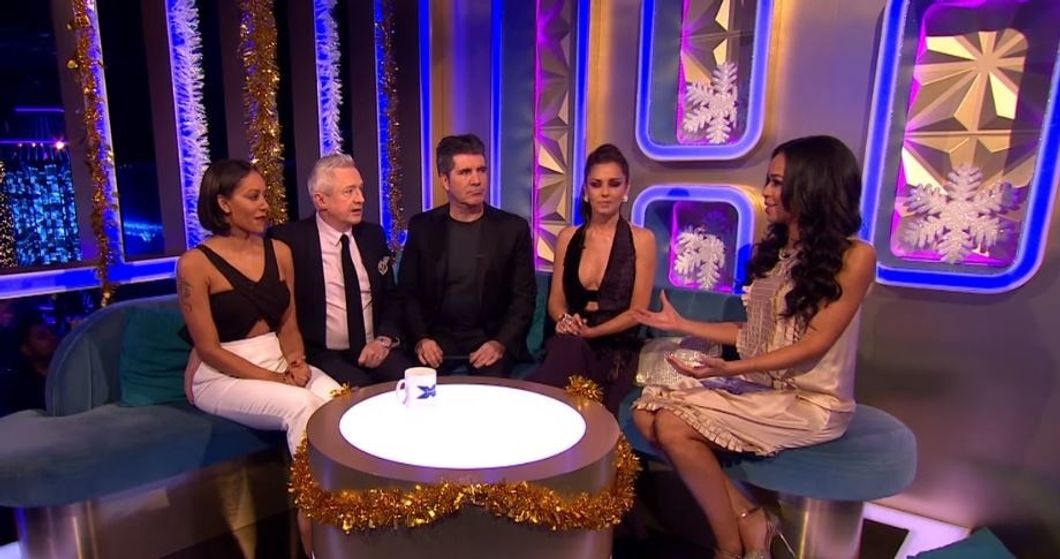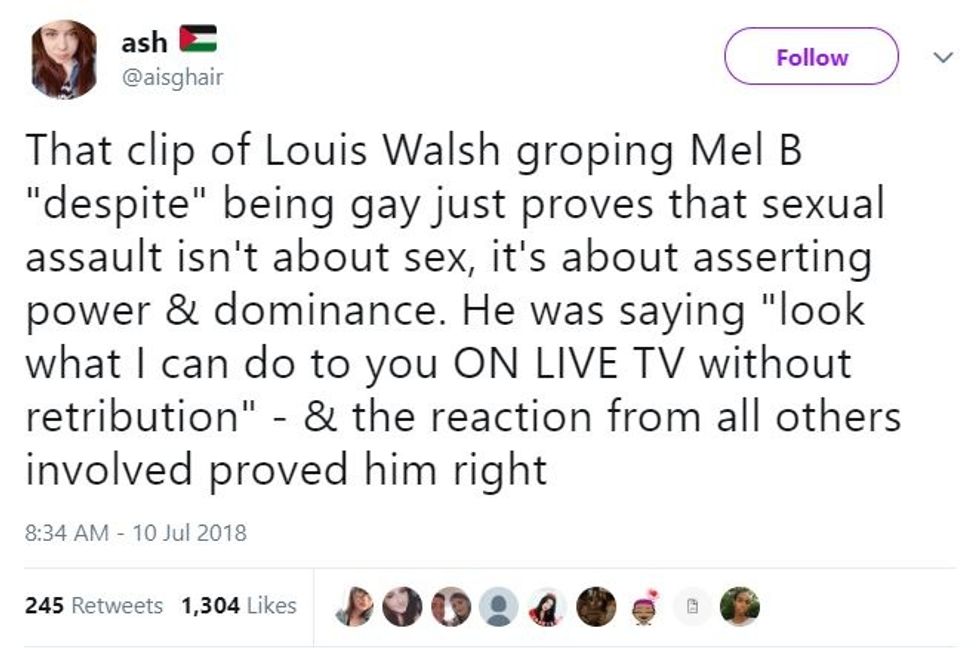Recently a clip from an Xtra Factor UK interview from 2014 has resurfaced on Twitter. The clip shows Louis Walsh groping Mel B's butt and, after being called out on it by her, laughing the whole situation off.
You can see his hand slowly travel downward, then tapping her bottom before finally squeezing it while laughing at a conversation going on. Mel B notices it and is visibly uncomfortable. She stops the interview and asks him why he's grabbing her butt, and while he excuses his behavior as "looking out for her" and Simon assures her she's "safe," she insists that it's inappropriate and scoots further away from him.
In turn, he and Simon laugh off the entire exchange, he scoots closer to her, and the interviewer, Sarah Jane Crawford, continues the interview. We never get to see how Mel B's female co-star, Cheryl Cole, reacts to the whole situation.
This exchange was cut from the final clip posted by the X Factor UK, but a Twitter user recorded the exchange, presumably from a recording of the live broadcast, and posted it. It has since divided Twitter users.
Some say Mel B was completely justified while others insist that because Louis Walsh is gay, he meant no harm by his fondling and Mel B calling him out only served to embarrass him.
Good. I hope so.
One Twitter user pointed out that his sexual orientation is irrelevant:
Nothing rings truer than "sexual assault isn't about sex, it's about asserting power and dominance." It doesn't matter if he didn't intend to derive any kind of pleasure from the encounter. What matters is that, in a sexual situation, Mel B was uncomfortable and it was Louis's fault.
People rushing to Louis's defense is symptomatic of a deeper problem in our culture. They're quick to disbelieve and blame the woman, the victim, instead of the perpetrator.
The eagerness to sweep the instance under the carpet allows perpetrators to feel more confident, knowing they won't be punished for their actions. When a man gets away with groping a woman on live TV, men and women in places of power everywhere will be emboldened to touch and speak to others however they please.
It may sound extreme at first, but this whole situation is rape culture.
These small allowances plant the seeds to turn a blind eye to bigger, more awful situations—until we're at the point where a man can rape an unconscious woman and only get three months of jail time because his bright and promising future shouldn't be marred by "20 minutes of action."
We can't allow instances like this. We have to come down hard on any and all forms of sexual harassment, with the punishment fitting the crime (PSA: sexual harassment is an actual crime, not "something that just happens").
Obviously, Louis Walsh shouldn't be treated like Brock Turner. But his actions should've been punished, probably more than just by simply calling him out on live TV, an exchange ultimately cut from the final posted clip anyway.
If Mel B had waited until they were no longer on live TV and his hand was no longer touching her, it would've been slightly out of place to bring it up. It's much like how when a child does something wrong or dangerous, you point it out right then; you don't wait. She could've still talked to him about it in private, but in addition to having called him out on it right when it was happening.
Not only was Mel B justified in calling out Louis Walsh, but any person in a similar situation is as well.
If you're ever in a situation that's even slightly sexual and you feel uncomfortable, say something. Don't let the other person get away with it. And if they're not ill-intentioned and truly didn't mean to make you uneasy, then they can learn from you voicing your discomfort.
It doesn't matter the situation or who's doing or saying something sexual that makes you feel uncomfortable. The voice of shame and self-blaming will find any way to justify their actions and keep you silent. Don't let it.
No matter how big or small the instance may seem to you, it's worth speaking up about.




















